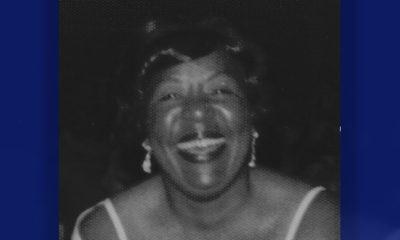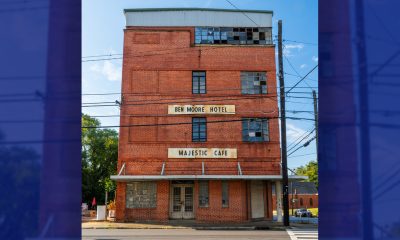Black History
369th Experience Band Ties HBCU Musicians to WWI Black History
VOICE AND VIEWPOINT — In 1919 when the Treaty of Versailles ended WWI, two years after the U.S. entered the fight with France and Great Britain against Germany, 44 Black colleges existed. Today, 100 years later, there are 101 public and private HBCUs, and they and their students are playing an important part in reclaiming the role African American soldiers and artists played in that conflict.
By Leonard E. Colvin
In 1919 when the Treaty of Versailles ended WWI, two years after the U.S. entered the fight with France and Great Britain against Germany, 44 Black colleges existed.
Today, 100 years later, there are 101 public and private HBCUs, and they and their students are playing an important part in reclaiming the role African American soldiers and artists played in that conflict.
Thanks to the United States World War I Centennial Commission, Coca Cola and the network of Historically Black Colleges and Universities (HBCUs), a band of 42 accomplished musicians from HBCUs are traveling around the country playing the sounds of the 369th Infantry Regimental Band that made its mark in history during WWI and WWII.
The old wartime regimental band was reincarnated four years ago in the form of the 369th Experience. Most of the new band’s 42 members are current students or pending graduates of the HBCUs.
Its namesake, the 369th Infantry Regimental Band of WWI and WWII, used musical instruments and its artists with a flair for Jazz, originated by African Americans, to establish its legacy, and introduce the art form to the Europeans.
The WWI band was formed to accompany the 369th Infantry Regiment, a group of Black fighting troops. Its assignment was to boost the morale of the Black troops comprising the 369th Infantry Regiment, formerly known as the 15th New York National Guard Regiment and commonly referred to as the Harlem Hellfighters.
The Black soldiers in the field fought valiantly with their grit and guns to help the allies win WWI and show that Black men could fight for freedom.
The accompanying band was led by and composed of established musical professionals. In the process of performing their assignment, they also exported Jazz music,crafted by African Americans to the allied nations.
One of the band’s leaders, James Reese Europe was a respected artist in Harlem music circles before he was assigned to the military band. He went on to direct the regimental band to great acclaim.
In February and March 1918, James Reese Europe and his military band traveled over 2,000 miles in France, performing for British, French and American military audiences as well as French civilians. Europe’s “Hellfighters” also made their first recordings in France for the Pathé brothers.
According to the key organizers of the current project involving HBCU students, The 369th Experience is designed to introduce people of all cultures, especially the band members, to the band’s legacy and the role it and the fighting soldiers of the 369th played in WWI.
Also, a goal is to use the band to display the Jazz music art form to audiences domestically and abroad.
It is taking place at a time when HIP-HOP and Neo-soul are overshadowing Jazz as an art form among Black people, despite efforts since the 1970s, to repackage Jazz as a popular and “profitable” genre of music to the masses.
“We chose HBCU band students because we knew we would get the best students in terms of music and marching formation!” said Stephany B. O’Neal, publicity director for the outfit. “We had to use HBCUs to even come close to representing the Harlem Hellfighters and James Reese Europe.
“This is a totally historic event,” she continued. “Bringing the Harlem Hellfighters full circle. They won all kinds of awards from the French and totally changed the music industry in Europe.
“Like the Black soldiers who fought on the battlefield, after the war, the band suffered many slights, despite the respect the French soldiers and later the governments bestowed upon them,” O’Neal said.
She said after the war, in Paris, France, the band was not allowed to join in the victory parade with the Americans when they marched down the Champs Elysees.
To right that wrong, plans are in the works for the 369th Experience Band to travel to Versailles, France at the upcoming International observance of the Centennial of the signing of the Treaty which ended WWI.
During the 2019 Memorial Day Weekend, in conjunction with New York’s annual Fleet Week Observance, the band performed at Rockefeller Center, Marcus Garvey Park, the Liberty Park, and in New Jersey at Harlem One Stop, a historical site.
The effort to recreate the 369th Infantry Regimental Band was launched in 2013.
After the plea was made before the House Appropriation Committee, it took several years before funding for the project was first submitted.
The U.S. Army School of Music, and their PR Personnel, Noble Sissle, Jr., son of one of the original band members, and O’Neal, even before the funding was secured, hammered together the framework andfoundation of the band’s operation.
They developed the audition criteria, auditioned the students online, hired a band leader who worked at Ohio State and once all the students were selected, began rehearsing.
“We could not get all the students in one place to rehearse and engage them,” said O’Neal, “so we did it online and in sections and we had some problems. But Coke funded a better online conferencing system, so we managed to do a lot of work even before the band members and directors met each other in person.”
Although there were 65 members of the original 365th Infantry Regimental Band, currently there are 42 members from HBCUs and 1 historically white school.
Prairie View, Florida A&M and Southern University, all southern HBCUs, have the most representatives on the band.
Eventually, the band’s membership will be expanded to 65, O’Neal said. She said that recruiting for future membership is ongoing. She said HBCU veteran band members alert and recruit band members from their respective schools to apply to be a member.
People who are interested should go to the 369th website to apply for an audition, O’Neal said.
This article originally appeared in the Voice and Viewpoint.
Activism
Oakland Post: Week of November 26 – December 2, 2025
The printed Weekly Edition of the Oakland Post: Week of November 26 – December 2, 2025

To enlarge your view of this issue, use the slider, magnifying glass icon or full page icon in the lower right corner of the browser window.
Activism
Oakland Post: Week of November 19 – 25, 2025
The printed Weekly Edition of the Oakland Post: Week of November 19 – 25, 2025

To enlarge your view of this issue, use the slider, magnifying glass icon or full page icon in the lower right corner of the browser window.
Activism
IN MEMORIAM: William ‘Bill’ Patterson, 94
Bill devoted his life to public service and education. In 1971, he became the founding director for the Peralta Community College Foundation, he also became an administrator for Oakland Parks and Recreation overseeing 23 recreation centers, the Oakland Zoo, Children’s Fairyland, Lake Merritt, and the Henry J. Kaiser Convention Center.

William “Bill” Patterson, 94, of Little Rock, Arkansas, passed away peacefully on October 21, 2025, at his home in Oakland, CA. He was born on May 19, 1931, to Marie Childress Patterson and William Benjamin Patterson in Little Rock, Arkansas. He graduated from Dunbar High School and traveled to Oakland, California, in 1948. William Patterson graduated from San Francisco State University, earning both graduate and undergraduate degrees. He married Euradell “Dell” Patterson in 1961. Bill lovingly took care of his wife, Dell, until she died in 2020.
Bill devoted his life to public service and education. In 1971, he became the founding director for the Peralta Community College Foundation, he also became an administrator for Oakland Parks and Recreation overseeing 23 recreation centers, the Oakland Zoo, Children’s Fairyland, Lake Merritt, and the Henry J. Kaiser Convention Center.
He served on the boards of Oakland’s Urban Strategies Council, the Oakland Public Ethics Commission, and the Oakland Workforce Development Board.
He was a three-term president of the Oakland branch of the NAACP.
Bill was initiated in the Gamma Alpha chapter of Kappa Alpha Psi Fraternity.
In 1997 Bill was appointed to the East Bay Utility District Board of Directors. William Patterson was the first African American Board President and served the board for 27 years.
Bill’s impact reached far beyond his various important and impactful positions.
Bill mentored politicians, athletes and young people. Among those he mentored and advised are legends Joe Morgan, Bill Russell, Frank Robinson, Curt Flood, and Lionel Wilson to name a few.
He is survived by his son, William David Patterson, and one sister, Sarah Ann Strickland, and a host of other family members and friends.
A celebration of life service will take place at Henry J. Kaiser Convention Center (Calvin Simmons Theater) on November 21, 2025, at 10 AM.
His services are being livestreamed at: https://www.facebook.com/events/1250167107131991/
In lieu of flowers, donations can be made to the Euradell and William Patterson scholarship fund TBA.

-

 Activism4 weeks ago
Activism4 weeks agoOakland Post: Week of November 5 – 11, 2025
-

 Activism3 weeks ago
Activism3 weeks agoOakland Post: Week of November 12 – 18, 2025
-

 Activism2 weeks ago
Activism2 weeks agoIN MEMORIAM: William ‘Bill’ Patterson, 94
-

 Activism3 weeks ago
Activism3 weeks agoHow Charles R. Drew University Navigated More Than $20 Million in Fed Cuts – Still Prioritizing Students and Community Health
-

 #NNPA BlackPress3 weeks ago
#NNPA BlackPress3 weeks agoThe Perfumed Hand of Hypocrisy: Trump Hosted Former Terror Suspect While America Condemns a Muslim Mayor
-

 Bay Area3 weeks ago
Bay Area3 weeks agoNo Justice in the Justice System
-

 #NNPA BlackPress3 weeks ago
#NNPA BlackPress3 weeks agoProtecting Pedophiles: The GOP’s Warped Crusade Against Its Own Lies
-

 #NNPA BlackPress4 weeks ago
#NNPA BlackPress4 weeks ago2026 Subaru Forester Wilderness Review: Everyday SUV With Extra Confidence
























































